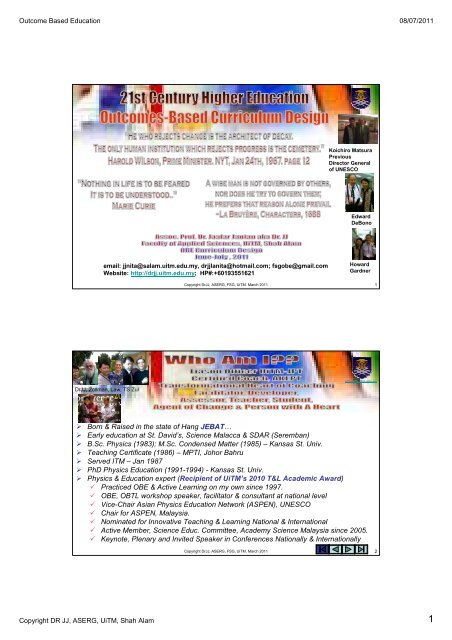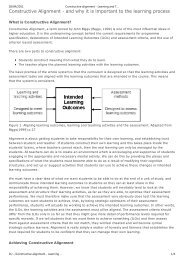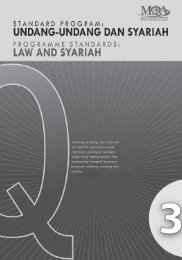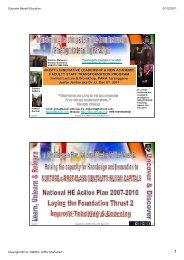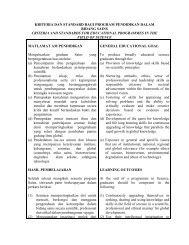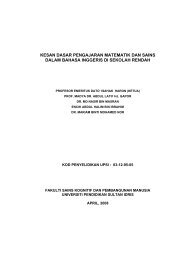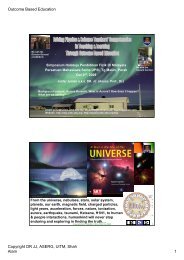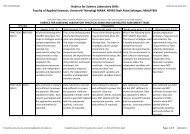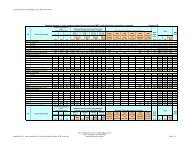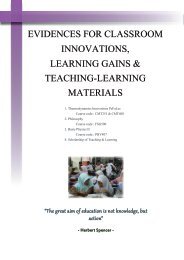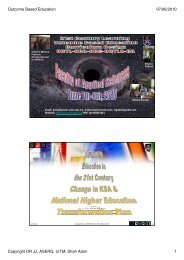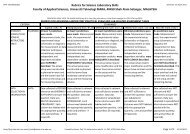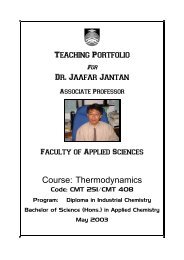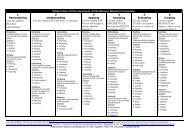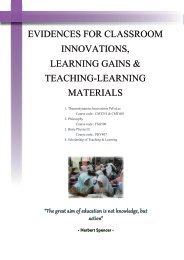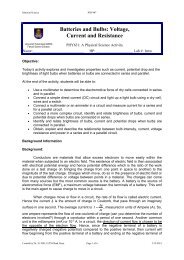KLMU Workshop July 2011 ppt (pdf) - DrJJ - UiTM
KLMU Workshop July 2011 ppt (pdf) - DrJJ - UiTM
KLMU Workshop July 2011 ppt (pdf) - DrJJ - UiTM
You also want an ePaper? Increase the reach of your titles
YUMPU automatically turns print PDFs into web optimized ePapers that Google loves.
Outcome Based Education 08/07/<strong>2011</strong><br />
Koichiro Matsura<br />
Previous<br />
Director General<br />
of UNESCO<br />
Edward<br />
DeBono<br />
email: jjnita@salam.uitm.edu.my, drjjlanita@hotmail.com; fsgobe@gmail.com<br />
Website: http://drjj.uitm.edu.my; HP#:+60193551621<br />
Howard<br />
Gardner<br />
Copyright <strong>DrJJ</strong>, ASERG, FSG, <strong>UiTM</strong>. March <strong>2011</strong> 1<br />
http://drjj.uitm.edu.my<br />
<strong>DrJJ</strong>, Zollman, Law, TS Zul<br />
Born & Raised in the state of Hang JEBAT…<br />
Early education at St. David’s, Science Malacca & SDAR (Seremban)<br />
B.Sc. Physics (1983); M.Sc. Condensed Matter (1985) – Kansas St. Univ.<br />
Teaching Certificate (1986) – MPTI, Johor Bahru<br />
Served ITM – Jan 1987<br />
PhD Physics Education (1991-1994) - Kansas St. Univ.<br />
Physics & Education expert (Recipient of <strong>UiTM</strong>’s 2010 T&L Academic Award)<br />
Practiced OBE & Active Learning on my own since 1997.<br />
OBE, OBTL workshop speaker, facilitator & consultant at national level<br />
Vice-Chair Asian Physics Education Network (ASPEN), UNESCO<br />
Chair for ASPEN, Malaysia.<br />
Nominated for Innovative Teaching & Learning National & International<br />
Active Member, Science Educ. Committee, Academy Science Malaysia since 2005.<br />
Keynote, Plenary and Invited Speaker in Conferences Nationally & Internationally<br />
Copyright <strong>DrJJ</strong>, ASERG, FSG, <strong>UiTM</strong>. March <strong>2011</strong> 2<br />
Copyright DR JJ, ASERG, <strong>UiTM</strong>, Shah Alam 1
Outcome Based Education 08/07/<strong>2011</strong><br />
http://drjj.uitm.edu.my<br />
Copyright <strong>DrJJ</strong>, ASERG, FSG, <strong>UiTM</strong>. March <strong>2011</strong> 3<br />
AIM: This 2-days 2<br />
workshop intend to provide you with the conceptual<br />
understanding and the procedural knowledge of Outcomes Based<br />
Curriculum Design by Designing Backwards<br />
The objectives (what I plan to do) of this 2-days 2<br />
workshop are:<br />
1. Describe the characteristics of 21st Century Learners, the role of MQA, the<br />
philosophy of Outcomes-Based Education & the design of Outcomes-Based<br />
Curriculum in Malaysian Higher Education.<br />
2. Describe Program Educational Objectives (PEOs(<br />
PEOs), the Program Learning<br />
Outcomes (PLOs) and its matrix.<br />
3. Describe the LOKI curriculum mapping process (curriculum and taxonomy<br />
matrix) using Dr JJ’s curriculum mapping template.<br />
4. Explain the formulation of Course Learning Outcomes (CLOs)-if time permits..<br />
5. Verbally criticize your products.<br />
Copyright <strong>DrJJ</strong>, ASERG, FSG, <strong>UiTM</strong>. March <strong>2011</strong> 4<br />
Copyright DR JJ, ASERG, <strong>UiTM</strong>, Shah Alam 2
Outcome Based Education 08/07/<strong>2011</strong><br />
AIM: This 2-days 2<br />
workshop intend to provide you with the understanding<br />
and the procedural knowledge to develop Outcomes-Based Curriculum<br />
Design<br />
Learning Outcomes (what YOU will know and be able to do- this is your<br />
TAKE-AWAY AWAY for today)<br />
Upon successful completion of this workshop, you will be able to:<br />
1. Explain the impact of 21 st Century Learning and role of Malaysian Qualification<br />
Framework on designing new curriculum. (conceptual knowledge-C2<br />
C2-LO1) LO1).<br />
2. Critically review existing Program Educational Objectives (PEOs) and Program<br />
Learning Outcomes (PLOs). (Functional-C4<br />
C4-LO3).<br />
3. Critically review existing a PLO-PEO PEO and PLO-LOKI LOKI matrix. (Functional (Procedural)(<br />
Knowledge C3-LO3).<br />
4. Critically review the existing<br />
Curriculum Matrix (Course-LOKI)<br />
(Functional<br />
(Procedural) Knowledge C3-LO3,<br />
the Curriculum Depth (Competency) Matrix & the<br />
Soft Skills (KI) Depth Matrix (Functional (Procedural) Knowledge C3-LO3)<br />
LO3).<br />
5. Critically review and communicate your Course Learning Outcomes (Functional<br />
Knowledge C3-LO3<br />
LO3.<br />
Copyright <strong>DrJJ</strong>, ASERG, FSG, <strong>UiTM</strong>. March <strong>2011</strong> 5<br />
Copyright <strong>DrJJ</strong>, ASERG, FSG, <strong>UiTM</strong>. March <strong>2011</strong> 6<br />
Copyright DR JJ, ASERG, <strong>UiTM</strong>, Shah Alam 3
Outcome Based Education 08/07/<strong>2011</strong><br />
08/07/201<br />
1<br />
Copyright <strong>DrJJ</strong>, ASERG, FSG, <strong>UiTM</strong>. March <strong>2011</strong> 7<br />
http://drjj.uitm.edu.my<br />
08/07/<strong>2011</strong> Copyright <strong>DrJJ</strong>, ASERG, FSG, <strong>UiTM</strong>. March <strong>2011</strong> 8<br />
Copyright DR JJ, ASERG, <strong>UiTM</strong>, Shah Alam 4
Outcome Based Education 08/07/<strong>2011</strong><br />
“To realise our national aspirations, a concerted effort is needed to increase our<br />
nation’s competitiveness, productivity and innovativeness. Attributes such as desire<br />
for knowledge, innovative thinking, creativity and competitiveness must be<br />
imbued within our people. The inculcation of moral values, progressiveness<br />
and performance-based cultures must also be instilled if we are to nurture<br />
successful individuals of the highest quality. This will determine our success as a<br />
knowledge-based economy…” Prime Minister’s Message<br />
….“This transformation plan aims squarely on holistic human capital (modal insan)<br />
development, to produce Malaysians who are intellectually active, , creative and<br />
innovative, ethically and morally upright, adaptable and capable of critical<br />
thinking. The model human capital would also need to be well-rounded<br />
individuals with an appreciation for humanistic pursuits such as the arts,<br />
culture, sports and volunteerism. This process will create the environment<br />
necessary for the development of an individual to find and fully achieve his or her<br />
personal potential….”<br />
Source: NATIONAL HIGHER EDUCATION ACTION PLAN 2007-2010;<br />
Triggering Higher Education Transformation AUGUST 27, 2007<br />
08/07/<strong>2011</strong> Copyright <strong>DrJJ</strong>, ASERG, FSG, <strong>UiTM</strong>. March <strong>2011</strong> 9<br />
“What carries more weight appears to be soft skills rather than brainpower b<br />
or<br />
technical skills.” “Hard skills” refer to academic and technical knowledge. “Soft skills”<br />
are generally categorised into three areas – character, interpersonal skills and<br />
critical and creative thinking – all of which are required to survive and succeed in the<br />
workplace.<br />
These skills enable one to communicate effectively, manage relationships, lead a<br />
team, solve problems and so on.<br />
Source: The Star Online: Sunday September 23, 2007.<br />
http://thestar.com.my/news/story.aspfile=/2007/9/23/focus/18887876&sec=focus<br />
“The MEF Salary Survey for Executives 2010 revealed that 68% of the companies<br />
surveyed named communication skills as the top quality required in job applicants,<br />
followed by working experience (67%), interpersonal skills (56.2%) and passion and<br />
commitment (55.7%).<br />
MEF executive director Shamsuddin Bardan said globalisation had changed the nature<br />
of jobs, making communication skills, specifically in English, a valuable asset for today's<br />
worker…” Source: THE STAR, April 15 th , <strong>2011</strong><br />
08/07/<strong>2011</strong> Copyright <strong>DrJJ</strong>, ASERG, FSG, <strong>UiTM</strong>. March <strong>2011</strong> 10<br />
Copyright DR JJ, ASERG, <strong>UiTM</strong>, Shah Alam 5
Outcome Based Education 08/07/<strong>2011</strong><br />
The objective of Malaysian Higher Education system is to produce<br />
professionals as demanded by the nation for human resources<br />
Source:HE Transformation Agenda 2007-2010<br />
2010<br />
One purpose of higher education is to graduate students who will become<br />
productive citizens. Skills employers consistently seek from university<br />
graduates:<br />
<br />
<br />
<br />
<br />
<br />
<br />
<br />
Communication skills<br />
Scientific (problem-solving) skills<br />
decision-making skills which enable students to become leaders<br />
well developed analytical skills<br />
teamwork skills<br />
well-practiced leadership skills.<br />
good interpersonal skills<br />
08/07/<strong>2011</strong> Copyright <strong>DrJJ</strong>, ASERG, FSG, <strong>UiTM</strong>. March <strong>2011</strong> 11<br />
08/07/<strong>2011</strong> Copyright <strong>DrJJ</strong>, ASERG, FSG, <strong>UiTM</strong>. March <strong>2011</strong> 12<br />
Copyright DR JJ, ASERG, <strong>UiTM</strong>, Shah Alam 6
Outcome Based Education 08/07/<strong>2011</strong><br />
http://drjj.uitm.edu.my<br />
08/07/<strong>2011</strong> Copyright <strong>DrJJ</strong>, ASERG, FSG, <strong>UiTM</strong>. March <strong>2011</strong> 13<br />
Developing 3 Domains of Education-Learn<br />
Affective<br />
Heart<br />
Feeling, The Heart<br />
The CARE, Emotions<br />
Cognitive<br />
Head<br />
Knowing, the Head<br />
The KNOWLEDGE (F,C,P)<br />
Intellectual Skills (FC)<br />
http://drjj.uitm.edu.my<br />
Psychomotor<br />
Hand, Body<br />
Doing, The Hand<br />
The SKILLS<br />
(3+1)H<br />
08/07/<strong>2011</strong><br />
Copyright <strong>DrJJ</strong>, ASERG, FSG, <strong>UiTM</strong>. March <strong>2011</strong> 14<br />
Copyright DR JJ, ASERG, <strong>UiTM</strong>, Shah Alam 7
Outcome Based Education 08/07/<strong>2011</strong><br />
Learning is<br />
what students know (factual, conceptual, procedural & metacognitive<br />
knowledge)-growth growth in the knowledge dimensions.<br />
what they can do with what they know (functional knowledge) –<br />
cognitive dimension process.<br />
Attitudes – making choices.<br />
Skills-acting on choices with precision.<br />
08/07/<strong>2011</strong><br />
The 21 st Century MUST HAVE skills:<br />
http://drjj.uitm.edu.my<br />
“Learning should be relevant to the variety of graduates ‘roles included<br />
in their working, civic and personal life.” Transformational OBE<br />
“It is an emphasis on what students can do with knowledge, rather than<br />
what units of knowledge they have, , that best describes the essence of<br />
21st century skills.” – attaining learning outcomes<br />
Elena Silva in the Education Sector Report 2008<br />
Copyright <strong>DrJJ</strong>, ASERG, FSG, <strong>UiTM</strong>. March <strong>2011</strong> 15<br />
One of the most important goals of a university is to develop<br />
individuals who have advanced literacy skills in their<br />
discipline: people who can participate effectively by<br />
critiquing information and ideas and by contributing with<br />
rigour and creativity to new insights and knowledge, who<br />
are self-aware as learners, and who are rhetorically versatile,<br />
confident communicators able to adapt and contribute to<br />
the demands of employment and life in a changing<br />
society and wider world.<br />
08/07/<strong>2011</strong><br />
http://drjj.uitm.edu.my<br />
“A A university is an institution that provides experiences for intense<br />
interaction between students & teachers” – Syed Naquib quoted by<br />
Deputy Minister of HE at the opening of EDUCATE conference, Nikko Hotel,<br />
Oct 7 th , 2010<br />
Copyright <strong>DrJJ</strong>, ASERG, FSG, <strong>UiTM</strong>. March <strong>2011</strong> 16<br />
Copyright DR JJ, ASERG, <strong>UiTM</strong>, Shah Alam 8
Outcome Based Education 08/07/<strong>2011</strong><br />
http://drjj.uitm.edu.my<br />
Can explain: provide thorough, supported, and justifiable accounts<br />
of phenomena, facts, and data.<br />
Can interpret: tell meaningful stories; offer apt translations; provide<br />
a revealing historical or personal dimension to ideas and events;<br />
make it personal or accessible through images, anecdotes,<br />
analogies, and models.<br />
Can apply: effectively use and adapt what we know in diverse<br />
contexts.<br />
Have perspective: see and hear points of view through critical eyes<br />
and ears; see the big picture.<br />
Source: Grant Wiggins and Jay McTighe. Understanding by Design; Chap 4.<br />
08/07/<strong>2011</strong><br />
Copyright <strong>DrJJ</strong>, ASERG, FSG, <strong>UiTM</strong>. March <strong>2011</strong> 17<br />
http://drjj.uitm.edu.my<br />
Sternberg suggests Curriculum must develop the other 3 R’s.<br />
• Reasoning (analyze, criticize, solve, propose, develop)<br />
• which include analytical, critical thinking, and problem solving skills<br />
• Resilience<br />
• which encompasses life skills such as flexibility, adaptability, and<br />
self-reliance<br />
• Responsibility<br />
• wisdom, which he defines as “the application of intelligence,<br />
creativity, and knowledge for a common good.”<br />
Sternberg, R. & Subotnik, R., eds. (2006). Optimizing Student Success with the Other Three Rs:<br />
Reasoning, Resilience, and Responsibility. Greenwich, CT: Information Age Publishing.<br />
08/07/<strong>2011</strong><br />
Copyright <strong>DrJJ</strong>, ASERG, FSG, <strong>UiTM</strong>. March <strong>2011</strong> 18<br />
Copyright DR JJ, ASERG, <strong>UiTM</strong>, Shah Alam 9
Outcome Based Education 08/07/<strong>2011</strong><br />
08/07/<strong>2011</strong> Copyright <strong>DrJJ</strong>, ASERG, FSG, <strong>UiTM</strong>. March <strong>2011</strong> 19<br />
http://drjj.uitm.edu.my<br />
If you are, you breath.<br />
If you breath, you talk.<br />
If you talk, you ask.<br />
If you ask, you think.<br />
If you think, you search.<br />
If you search, you experience.<br />
If you experience, you learn.<br />
If you learn, you grow.<br />
If you grow, you wish.<br />
If you wish, you find.<br />
If you understand, you know.<br />
If you know, you want to know more…<br />
And if you want to know more,<br />
If you find, , you doubt.<br />
If you doubt, you question.<br />
If you question, you understand.<br />
And if you want to know more, you are alive.<br />
Video courtesy of National Geographic Channel<br />
08/07/<strong>2011</strong><br />
Copyright <strong>DrJJ</strong>, ASERG, FSG, <strong>UiTM</strong>. March <strong>2011</strong> 20<br />
Copyright DR JJ, ASERG, <strong>UiTM</strong>, Shah Alam 10
Outcome Based Education 08/07/<strong>2011</strong><br />
http://drjj.uitm.edu.my<br />
08/07/<strong>2011</strong><br />
Copyright <strong>DrJJ</strong>, ASERG, FSG, <strong>UiTM</strong>. March <strong>2011</strong> 21<br />
Reflect & communicate on the following tasks:<br />
Rate yourself in terms of factual, conceptual, procedural & functional knowledge of<br />
OBE-OBTL; 1-Novice, 2-Advanced 2<br />
beginner, 3-Competent, 3<br />
4-Proficient, 4<br />
5-Expert5<br />
What do you hope to achieve in this workshop. Why are you here-HONESTY Pls..<br />
!! Write down your goal and state at least 2 learning outcomes you intend to<br />
achieve.<br />
How do you propose to effectively & meaningfully achieve the outcomes<br />
!! List out your own committment in achieving the outcomes.-<br />
How can I facilitate your achievement of the intended outcomes<br />
!! List out 2 specific tasks and actions that you expect me to do in facilitating<br />
your achievement.<br />
http://drjj.uitm.edu.my<br />
Guidelines to perform the tasks<br />
• Individually, spend 2 minutes doing this task.<br />
• Pick a name for your learning community & a spokesperson.. Spend 3 minutes to<br />
discuss and conclude the learning group’s decision on each of the task above.<br />
• Pick a name for your learning group. Verbally communicate with the learning<br />
community the decision of the group.<br />
08/07/<strong>2011</strong><br />
Copyright <strong>DrJJ</strong>, ASERG, FSG, <strong>UiTM</strong>. March <strong>2011</strong> 22<br />
Copyright DR JJ, ASERG, <strong>UiTM</strong>, Shah Alam 11
Outcome Based Education 08/07/<strong>2011</strong><br />
http://drjj.uitm.edu.my<br />
7/8/<strong>2011</strong> Copyright <strong>DrJJ</strong>, ASERG, FSG, <strong>UiTM</strong>. March <strong>2011</strong> 23<br />
http://drjj.uitm.edu.my<br />
08/07/<strong>2011</strong><br />
Copyright <strong>DrJJ</strong>, ASERG, FSG, <strong>UiTM</strong>. March <strong>2011</strong> 24<br />
Copyright DR JJ, ASERG, <strong>UiTM</strong>, Shah Alam 12
Outcome Based Education 08/07/<strong>2011</strong><br />
• Point of reference & joint understanding of HE Qualifications in<br />
Malaysia<br />
• An instrument that<br />
• develops and classifies qualifications based on a set of criteria<br />
that are approved nationally and benchmarked against<br />
international best practices,<br />
• and which clarifies the earned academic levels, , learning<br />
outcomes of study areas and credit system based on student<br />
academic load (Student Learning Time, SLT).<br />
• These criteria are accepted and used for all qualifications awarded by<br />
recognised higher education providers. Hence, MQF integrates with<br />
and links all national qualifications.<br />
MQF<br />
08/07/201<br />
1<br />
Copyright <strong>DrJJ</strong>, ASERG, FSG, <strong>UiTM</strong>. March <strong>2011</strong> 25<br />
Copyright DR JJ, ASERG, <strong>UiTM</strong>, Shah Alam 13
Outcome Based Education 08/07/<strong>2011</strong><br />
http://drjj.uitm.edu.my<br />
"Learning outcomes represent<br />
culminating demonstrations of learning and<br />
achievement.<br />
They are not simply a listing of discrete skills, nor<br />
broad statements of knowledge and comprehension.<br />
They describe performances that demonstrate<br />
that significant learning has been verified and<br />
achieved by graduates of the program."<br />
A A description of the Competency for the KSA<br />
attainment appropriate of university graduates.<br />
08/07/<strong>2011</strong><br />
Copyright <strong>DrJJ</strong>, ASERG, FSG, <strong>UiTM</strong>. March <strong>2011</strong> 27<br />
http://drjj.uitm.edu.my<br />
Program Specific Competencies for Science Graduates:<br />
1. You acquire knowledge and skills to obtain a professional position or pursue<br />
graduate degree<br />
2. You understand physical laws and principles and use analytical methods to<br />
examine, explain and predict the workings of the physical world (for physics)<br />
3. You gain knowledge of biochemistry, microbiology and immunology<br />
Generic Competencies for Science Graduates:<br />
1. You use practical, safe techniques in the laboratory to conduct research in the<br />
field of study<br />
2. You instruct co-workers in scientific procedure<br />
3. You’re able to develop and use scientific software to support research<br />
4. You use the principles of the scientific method and apply experimental<br />
techniques to solve specific problems<br />
5. You’re able to conduct research in the field<br />
08/07/<strong>2011</strong><br />
Copyright <strong>DrJJ</strong>, ASERG, FSG, <strong>UiTM</strong>. March <strong>2011</strong> 28<br />
Copyright DR JJ, ASERG, <strong>UiTM</strong>, Shah Alam 14
Outcome Based Education 08/07/<strong>2011</strong><br />
MQF Framework for Diploma level-Outcomes: Median C3,P4, A3<br />
http://drjj.uitm.edu.my<br />
MQF<br />
08/07/201<br />
1<br />
Copyright <strong>DrJJ</strong>, ASERG, FSG, <strong>UiTM</strong>. March <strong>2011</strong> 29<br />
MQF – Bachelors degree (Hons(<br />
Hons.)<br />
– Median C4, P4, A3<br />
http://drjj.uitm.edu.my<br />
MQF<br />
08/07/201<br />
1<br />
Copyright <strong>DrJJ</strong>, ASERG, FSG, <strong>UiTM</strong>. March <strong>2011</strong> 30<br />
Copyright DR JJ, ASERG, <strong>UiTM</strong>, Shah Alam 15
Outcome Based Education 08/07/<strong>2011</strong><br />
To implement MQF as a reference point for Malaysian<br />
Qualifications<br />
To develop standards and criteria and all other relevant<br />
instruments as national references for the conferment of<br />
awards with the cooperation of stakeholders<br />
To assure quality of HEIs and programmes<br />
To accredit courses that fullfill the set criteria and standards<br />
To facilitate the recognition and articulation of qualifications<br />
To maintain the Malaysian Qualification Register (MQR)<br />
08/07/201<br />
1<br />
Copyright <strong>DrJJ</strong>, ASERG, FSG, <strong>UiTM</strong>. March <strong>2011</strong> 31<br />
MQA Code of Practice<br />
Good Practices:<br />
MQA<br />
Code of<br />
Practice<br />
….the quality assurance process is built on the following<br />
attributes:<br />
encourages a variety of teaching and learning methods<br />
ensures the choice of credible student assessment methods<br />
appropriate for the teaching and learning methods chosen;<br />
ensures there are adequate resources to deliver the curriculum;<br />
is concerned with good outcomes rather than detailed<br />
specifications of content<br />
08/07/201<br />
1<br />
Copyright <strong>DrJJ</strong>, ASERG, FSG, <strong>UiTM</strong>. March <strong>2011</strong> 32<br />
Copyright DR JJ, ASERG, <strong>UiTM</strong>, Shah Alam 16
Outcome Based Education 08/07/<strong>2011</strong><br />
MQA<br />
Code of<br />
Practice<br />
7/8/<strong>2011</strong> Copyright <strong>DrJJ</strong>, ASERG, FSG, <strong>UiTM</strong>. March <strong>2011</strong> 33<br />
http://drjj.uitm.edu.my<br />
08/07/<strong>2011</strong><br />
Copyright <strong>DrJJ</strong>, ASERG, FSG, <strong>UiTM</strong>. March <strong>2011</strong> 34<br />
Copyright DR JJ, ASERG, <strong>UiTM</strong>, Shah Alam 17
Outcome Based Education 08/07/<strong>2011</strong><br />
Howard<br />
Gardner<br />
Copyright <strong>DrJJ</strong>, ASERG, FSG, <strong>UiTM</strong>. March <strong>2011</strong> 35<br />
08/07/<strong>2011</strong><br />
Copyright <strong>DrJJ</strong>, ASERG, FSG, <strong>UiTM</strong>. March <strong>2011</strong> 36<br />
Copyright DR JJ, ASERG, <strong>UiTM</strong>, Shah Alam 18
Outcome Based Education 08/07/<strong>2011</strong><br />
http://drjj.uitm.edu.my<br />
The Outcomes-Based approach to course design is intended to<br />
make the expectations of the designer/educator<br />
more transparent to both the student and any<br />
regulatory or accrediting body (KPT, MQA, EAC).<br />
Unlike the traditional model of course design in higher<br />
education (focus on coverage), where the lecturer would decide<br />
what to include on a syllabus, based on his or her own<br />
judgement of what was important for students to know; or on<br />
personal research or other interests;<br />
the outcomes-based approach starts with a specification of what<br />
the student will be expected to achieve by the end of the<br />
program/course/unit/lesson<br />
/lesson<br />
08/07/<strong>2011</strong><br />
Copyright <strong>DrJJ</strong>, ASERG, FSG, <strong>UiTM</strong>. March <strong>2011</strong> 37<br />
Copyright <strong>DrJJ</strong>, ASERG, FSG, <strong>UiTM</strong>. March <strong>2011</strong> 38<br />
Copyright DR JJ, ASERG, <strong>UiTM</strong>, Shah Alam 19
Outcome Based Education 08/07/<strong>2011</strong><br />
Copyright <strong>DrJJ</strong>, ASERG, FSG, <strong>UiTM</strong>. March <strong>2011</strong> 39<br />
1. Clarity of focus about outcomes<br />
Always have the significant, culminating exit outcomes as the<br />
focus.<br />
Let the students know what they are aiming for.<br />
2. Designing backwards<br />
Design curriculum backward by using the major outcomes as<br />
the focus and linking all planning, teaching and assessment<br />
decisions directly to these outcomes<br />
CMAP-S<br />
CMAP-EDU<br />
CMAP-A<br />
CMAP-M<br />
Copyright <strong>DrJJ</strong>, ASERG, FSG, <strong>UiTM</strong>. March <strong>2011</strong> 40<br />
Copyright DR JJ, ASERG, <strong>UiTM</strong>, Shah Alam 20
Outcome Based Education 08/07/<strong>2011</strong><br />
3. Consistent, high expectations of success<br />
Set the expectation that OBE is for ALL learners.<br />
Expect students to succeed by providing them encouragement to<br />
engage deeply with the issues they are learning and to achieve the<br />
high challenging standard set (Spady, 1994b).<br />
4. Expanded opportunity<br />
Develop curriculum to give scope to every learner to learn in<br />
his/her own pace.<br />
Cater for individual needs and differences, for example,<br />
expansion of available time and resources so that all students<br />
succeed in reaching the exit outcomes.<br />
Copyright <strong>DrJJ</strong>, ASERG, FSG, <strong>UiTM</strong>. March <strong>2011</strong> 41<br />
Triarchic Theory of Intelligence (2003)<br />
Analytical intelligence, the ability to complete academic, problem-<br />
solving tasks, such as those used in traditional intelligence tests. These<br />
types of tasks usually present well-defined problems that have only a<br />
single correct answer.<br />
Creative or synthetic intelligence, the ability to successfully deal with<br />
new and unusual situations by drawing on<br />
existing knowledge and skills. Individuals high in creative intelligence<br />
may give 'wrong' answers because they see things from a different<br />
perspective.<br />
Practical intelligence, the ability to adapt to everyday life by drawing<br />
on existing knowledge and skills. Practical intelligence enables an<br />
individual to understand what needs to be done in a specific setting<br />
ting<br />
and then do it<br />
Robert Sternberg, Yale Psychology Professor & President of the American<br />
Psychological Association<br />
Copyright <strong>DrJJ</strong>, ASERG, FSG, <strong>UiTM</strong>. March <strong>2011</strong> 42<br />
Copyright DR JJ, ASERG, <strong>UiTM</strong>, Shah Alam 21
Outcome Based Education 08/07/<strong>2011</strong><br />
Howard Gardner on his Multiple intelligences Theory<br />
"Until a hundred years ago, if you wanted to have higher education, linguistic<br />
intelligence was important. I teach at Harvard, and 150 years ago, the<br />
entrance exams were in Latin, Greek and Hebrew. If, for example, you were<br />
dyslexic, that would be very difficult because it would be hard for you to learn<br />
those languages, which are basically written languages.“<br />
"While your IQ, which is sort of language logic, will get you behind the<br />
desk, if you don’t t know how to deal with people, if you don't know how to<br />
read yourself, you’re going to end up just staying at that desk forever or<br />
eventually being asked to make room for somebody who does have<br />
social or emotional intelligence."<br />
Intelligence is "the capacity to solve problems or to fashion products<br />
that are valued in one or more cultural setting" (Gardner & Hatch, 1989)<br />
Copyright <strong>DrJJ</strong>, ASERG, FSG, <strong>UiTM</strong>. March <strong>2011</strong> 43<br />
Traditional/Transitional OBE emphasises student mastery of<br />
traditional subject-related academic outcomes (usually with a strong<br />
focus on subject-specific specific content) and some cross-discipline<br />
outcomes (such as the ability to solve problems or to work co-<br />
operatively).<br />
Transformational OBE emphasises long-term, cross-curricular<br />
curricular<br />
outcomes that are related directly to students’ future life roles (such<br />
as being a productive worker or a responsible citizen or a parent).<br />
Spady (1994)<br />
Source: Killen, Roy (2005). Programming and assessment for quality teaching and<br />
learning. Chapter 2. Thomson Social Science Press<br />
Copyright DR JJ, ASERG, <strong>UiTM</strong>, Shah Alam 22
Outcome Based Education 08/07/<strong>2011</strong><br />
http://drjj.uitm.edu.my<br />
General (not<br />
directly<br />
measurable)<br />
MOHE<br />
Institutional Attributes<br />
Program level (Still general)<br />
Very general (not<br />
measurable)<br />
General (not<br />
directly<br />
measurable)<br />
Course Level (Specific but not directly measurable)<br />
Lesson Level (Very specific & MUST be measurable)<br />
08/07/<strong>2011</strong><br />
Copyright <strong>DrJJ</strong>, ASERG, FSG, <strong>UiTM</strong>. March <strong>2011</strong> 45<br />
http://drjj.uitm.edu.my<br />
08/07/<strong>2011</strong><br />
Copyright <strong>DrJJ</strong>, ASERG, FSG, <strong>UiTM</strong>. March <strong>2011</strong> 46<br />
Copyright DR JJ, ASERG, <strong>UiTM</strong>, Shah Alam 23
Outcome Based Education 08/07/<strong>2011</strong><br />
http://drjj.uitm.edu.my<br />
Outcomes-Based<br />
Interdisciplinary<br />
Project-based<br />
Research-driven<br />
Thematic & NOT textbook-driven<br />
(textbook as a resource)<br />
Connected to community<br />
Incorporates<br />
Bloom’s s HOTS<br />
Multiple Intelligences<br />
Learning Preferences<br />
Technology & multimedia<br />
Multiple literacies<br />
Authentic Assessment (tasks)<br />
Students work independently &<br />
interdependently<br />
Knowledge is<br />
constructed through research<br />
and application, and connected<br />
to previous knowledge, personal<br />
experience, , interests, talents<br />
and passions<br />
is NOT memorization of facts<br />
Assessment is<br />
demonstration of understanding<br />
through application in a variety<br />
of contexts<br />
NOT REGURGITATION<br />
By self, peer & facilitators<br />
By multiple ATs to show<br />
achievement of CLOs<br />
By using holistic rubrics<br />
08/07/<strong>2011</strong><br />
Copyright <strong>DrJJ</strong>, ASERG, FSG, <strong>UiTM</strong>. March <strong>2011</strong> 47<br />
http://drjj.uitm.edu.my<br />
MQF LOs Domains MOHE LOs, 2009-KSA<br />
i. Knowledge (K)<br />
ii. Practical skills (S)<br />
iii. Social skills and responsibilities (S)<br />
iv. Ethics, professionalism and<br />
humanities (A)<br />
v. Communication, leadership and<br />
team skills (A)<br />
vi. Scientific methods, critical thinking<br />
and problem solving skills (K)<br />
vii. Lifelong learning and information<br />
management (A)<br />
viii. Entrepreneurship and managerial<br />
skills (A)<br />
1. Knowledge (K)<br />
2. Practical Skills (S)<br />
3. Thinking and scientific skills (K)<br />
4. Communication skills (A/S)<br />
5. Social skills, teamwork and responsibility<br />
(A/S)<br />
6. Values, ethics, moral and professionalism (A)<br />
7. Information management and lifelong learning<br />
skills (A/S)<br />
8. Managerial and entrepreneurial skills (A/S)<br />
9. Leadership skills (A/S)<br />
08/07/<strong>2011</strong><br />
Copyright <strong>DrJJ</strong>, ASERG, FSG, <strong>UiTM</strong>. March <strong>2011</strong> 48<br />
Copyright DR JJ, ASERG, <strong>UiTM</strong>, Shah Alam 24
Outcome Based Education 08/07/<strong>2011</strong><br />
http://drjj.uitm.edu.my<br />
Copyright <strong>DrJJ</strong>, ASERG, FSG, <strong>UiTM</strong>. March <strong>2011</strong> 49<br />
http://drjj.uitm.edu.my<br />
<strong>KLMU</strong>’s VISION<br />
To be the regions leader in providing relevant, quality and affordable<br />
education to all<br />
MISSION<br />
To make quality education affordable and accessible to as many people as possible.<br />
To incorporate an equal balance of theoretical knowledge and practical learning in all<br />
our programmes to best prepare our graduates for employment.<br />
To produce graduates that are equipped with appropriate technical skills and a strong<br />
sense of integrity, as well as being highly analytical and capable of working both<br />
independently and in a team.<br />
To employ innovative technology that stimulates learning, ensuring that graduates<br />
learn to their full potential as well as having transferable skills in the latest software and<br />
hardware in their industry.<br />
COPPA<br />
EAC ABET WA<br />
Copyright <strong>DrJJ</strong>, ASERG, FSG, <strong>UiTM</strong>. March <strong>2011</strong> 50<br />
Copyright DR JJ, ASERG, <strong>UiTM</strong>, Shah Alam 25
Outcome Based Education 08/07/<strong>2011</strong><br />
http://drjj.uitm.edu.my<br />
Programme Aims<br />
To produce quality graduates to fill various managerial positions in the tourism<br />
industry.<br />
To provide relevant, effective training for middle management in all areas of the<br />
industry.<br />
To enable graduates to conduct research and development that will benefit their<br />
future employers.<br />
To develop transferable skills for entry level positions and career advancement.<br />
To apply and review industry management principles and technical skills.<br />
COPPA<br />
EAC ABET WA<br />
Copyright <strong>DrJJ</strong>, ASERG, FSG, <strong>UiTM</strong>. March <strong>2011</strong> 51<br />
http://drjj.uitm.edu.my<br />
BSc Hotel & Convention Management Programme Aims<br />
To produce quality graduates to fill various managerial positions in the tourism<br />
industry.<br />
To provide relevant, effective training for middle management in all areas of the<br />
industry.<br />
To enable graduates to conduct research and development that will benefit their<br />
future employers.<br />
To develop transferable skills for entry level positions and career advancement.<br />
To apply and review industry management principles and technical skills.<br />
COPPA<br />
EAC ABET WA<br />
Copyright <strong>DrJJ</strong>, ASERG, FSG, <strong>UiTM</strong>. March <strong>2011</strong> 52<br />
Copyright DR JJ, ASERG, <strong>UiTM</strong>, Shah Alam 26
Outcome Based Education 08/07/<strong>2011</strong><br />
http://drjj.uitm.edu.my<br />
Diploma in Hotel Management Programme Aims<br />
To equip students with the fundamentals of hotel management as well as specialized<br />
knowledge in the area of hotel business.<br />
To produce quality graduates to fill various managerial positions in the tourism<br />
industry.<br />
To provide relevant, effective training for middle management in all areas of the<br />
industry.<br />
To enable graduates to conduct research and development that will enhance their<br />
value to their future employers.<br />
To develop transferable skills for entry level positions and career advancement.<br />
To enable graduates to apply and improve industry management principles and<br />
technical skillsiew industry management principles and technical skills.<br />
COPPA<br />
EAC ABET WA<br />
Copyright <strong>DrJJ</strong>, ASERG, FSG, <strong>UiTM</strong>. March <strong>2011</strong> 53<br />
http://drjj.uitm.edu.my<br />
ABET’s s definition of PEOs:<br />
The program must have published Program Educational Objectives that are<br />
consistent with the mission of the institution, the needs of the<br />
program’s s various constituencies, and these criteria.<br />
There must be a documented and effective process, involving program<br />
constituencies, for the periodic review and revision of these program<br />
educational objectives.<br />
EAC’s definition<br />
Programme Objectives are specific goals consistent with the mission<br />
and vision of the IHL, that are responsive to the expressed interest of<br />
programme stakeholders, describing the expected achievements of<br />
graduates in their career and professional life few years after<br />
graduation.<br />
COPPA<br />
EAC ABET WA<br />
Copyright <strong>DrJJ</strong>, ASERG, FSG, <strong>UiTM</strong>. March <strong>2011</strong> 54<br />
Copyright DR JJ, ASERG, <strong>UiTM</strong>, Shah Alam 27
Outcome Based Education 08/07/<strong>2011</strong><br />
http://drjj.uitm.edu.my<br />
A programme’s stated aims, objectives and learning outcomes reflect what it wants the<br />
learner to achieve. It is crucial for these aims, objectives and learning outcomes to be<br />
expressed explicitly and be made known to learners and other stakeholders alike.<br />
Programme Aims<br />
Programme aims is an overarching statement on the purpose, philosophy and rationale<br />
in offering the programme.<br />
Benchmarked Standard (pp 25)<br />
• The programme objectives must reflect the key elements of the outcomes of<br />
• higher education that are in line with national and global developments.<br />
• The programme aims, objectives and learning outcomes must be developed in<br />
consultation with principal stakeholders which should include the academic staff.<br />
• The programme aims, objectives and learning outcomes must be consistent with,<br />
and supportive of, the HEP’s vision and mission.<br />
COPPA<br />
EAC ABET WA<br />
Copyright <strong>DrJJ</strong>, ASERG, FSG, <strong>UiTM</strong>. March <strong>2011</strong> 55<br />
http://drjj.uitm.edu.my<br />
Programme Educational Objectives are specific goals consistent with &<br />
supportive of the mission and vision of the IHL, reflect the key elements<br />
of higher education, in line with the national & global developments<br />
(contains the 9 MOHE LO domains), responsive to the expressed interest<br />
of programme stakeholders and describing the expected achievements<br />
or milestone of graduates in their career and professional life few years<br />
after graduation. PEOs are employability attributes and selling points of<br />
your program. The sentences begin with: Three to five years upon<br />
successful completion the program, our graduates will be….<br />
1. Graduates are competent, responsible, and practice professionalism in<br />
global context.<br />
2. Graduates are knowledgeable and capable to apply the evolving technology<br />
in mechanical engineering fields.<br />
COPPA<br />
EAC ABET WA<br />
Copyright <strong>DrJJ</strong>, ASERG, FSG, <strong>UiTM</strong>. March <strong>2011</strong> 56<br />
Copyright DR JJ, ASERG, <strong>UiTM</strong>, Shah Alam 28
Outcome Based Education 08/07/<strong>2011</strong><br />
http://drjj.uitm.edu.my<br />
Generic Program Educational Objectives (PEOs are employability attributes and selling<br />
points of your program) for FSG Diploma Programs. The sentences begin with<br />
Three to five years upon successfully completing the program, our graduates will be:<br />
1. semiprofessionals in applied sciences who analyze and apply the knowledge,<br />
understanding and laboratory experiences to provide quality products and services to<br />
the government agencies and science-related industries.<br />
2. semiprofessionals in applied sciences who lead and engage in teams in problem<br />
solving tasks across disciplines through effective communicative abilities<br />
3. semiprofessionals in applied sciences who continue to advance their knowledge and<br />
abilities by utilizing ICT to explore business opportunities in the science-related<br />
industry<br />
4. semiprofessionals in applied sciences who demonstrate ethical and professional<br />
values in providing services to the recipients and provider of the science-related<br />
industry.<br />
Task<br />
TCM Health EAC Eng Tech ABET WA<br />
MQA-Std-Business<br />
Copyright <strong>DrJJ</strong>, ASERG, FSG, <strong>UiTM</strong>. March <strong>2011</strong> 57<br />
http://drjj.uitm.edu.my<br />
Generic Program Educational Objectives (PEOs are employability attributes and selling<br />
points of your program) for FSG Degree Programs. The sentences begin with<br />
Three to five years upon successfully completing the program, our graduates will be:<br />
1. Scientists or science practitioners who synthesize and apply the knowledge,<br />
understanding and laboratory experiences to provide quality products and services to<br />
the government agencies and science-related industries locally and globally.<br />
2. Scientists or science practitioners who lead and engage in teams in problem solving<br />
tasks across disciplines through effective communicative abilities.<br />
3. Scientists or science practitioners who use ICT to advance their knowledge and skills<br />
and to explore business opportunities in the science-related industry locally and<br />
globally.<br />
4. Scientists or science practitioners who are integrate ethical and professional values<br />
in providing services to the recipients and provider of the science-related industry<br />
locally and globally.<br />
Task<br />
TCM Health EAC Eng Tech ABET WA<br />
MQA-Std-Business<br />
Copyright <strong>DrJJ</strong>, ASERG, FSG, <strong>UiTM</strong>. March <strong>2011</strong> 58<br />
Copyright DR JJ, ASERG, <strong>UiTM</strong>, Shah Alam 29
Outcome Based Education 08/07/<strong>2011</strong><br />
http://drjj.uitm.edu.my<br />
designing and developing machines - from supersonic fighter jets to<br />
bicycles to toasters.<br />
designing a component, a machine, a system or a process.<br />
analyzing their design using the principles of motion, energy,<br />
and force to insure the product functions safely, efficiently, reliably, and can<br />
be manufactured at a competitive cost. influence the design of other products as<br />
well - shoes, light bulbs and even doors.<br />
Copyright <strong>DrJJ</strong>, ASERG, FSG, <strong>UiTM</strong>. <strong>UiTM</strong>, March May <strong>2011</strong> 2008 59<br />
http://drjj.uitm.edu.my<br />
Generic Program Educational Objectives (PEOs are employability attributes and selling<br />
points of your program) for FSG Degree Programs. The sentences begin with<br />
Three to five years upon successfully completing the program, our bumiputra<br />
graduates will be:<br />
1. scientists or science practitioners who synthesize and apply the knowledge,<br />
understanding and laboratory experiences to provide quality products and services to<br />
the government agencies and science-related industries locally and globally<br />
2. scientists or science practitioners who lead and engage in teams in problem solving<br />
tasks across disciplines through effective communicative abilities.<br />
3. scientists or science practitioners who use ICT to advance their knowledge and skills<br />
and to explore business opportunities in the science-related industry locally and<br />
globally.<br />
4. scientists or science practitioners who practice ethical and professional values in<br />
providing services to the recipients and provider of the science-related industry<br />
locally and globally.<br />
Task<br />
TCM Health EAC Eng Tech ABET WA<br />
MQA-Std-Business<br />
Copyright <strong>DrJJ</strong>, ASERG, FSG, <strong>UiTM</strong>. March <strong>2011</strong> 60<br />
Copyright DR JJ, ASERG, <strong>UiTM</strong>, Shah Alam 30
Outcome Based Education 08/07/<strong>2011</strong><br />
http://drjj.uitm.edu.my<br />
<br />
<br />
specialize in manufacturing, robotics, automotive/transportation, airconditioning,<br />
automotive, aerospace, chemical, computer,<br />
communication, paper, power generation industries, manufacturing<br />
industries, environmental and bio-medical fields.<br />
work on everything from artificial organs to the expanding field of<br />
nanotechnology.<br />
Every product or service in modern life has probably been touched d in<br />
some way by a mechanical engineer – had, could and will still be your<br />
graduates..<br />
Copyright <strong>DrJJ</strong>, ASERG, FSG, <strong>UiTM</strong>. <strong>UiTM</strong>, March May <strong>2011</strong> 2008 61<br />
TCM Health EAC UMP ABET WA<br />
http://drjj.uitm.edu.my<br />
Generic Engineering Program Educational Objectives (PEOs are employability attributes<br />
and selling points of your program) for FKEE Degree Programs. The sentences begin<br />
with<br />
Three to five years upon completing the program, our graduates will be:<br />
1. Engineers or engineering practitioners who synthesize and apply the science &<br />
mathematics & engineering knowledge, understanding and laboratory experiences to<br />
provide quality products and services to the government agencies and to the scienceengineering-technology<br />
(SET) industries locally and globally.<br />
2. Engineers or engineering practitioners who communicate effectively in leading and<br />
engaging multidisciplinary teams in solving engineering problems locally and<br />
globally.<br />
3. Engineers or engineering practitioners who utilize ICT to advance their engineering<br />
knowledge and skills and to explore business opportunities in the scienceengineering-technology<br />
(SET) industries locally and globally.<br />
4. Engineers or engineering practitioners who integrate ethical and professional values<br />
in providing services to the recipients and provider of the science-engineeringtechnology<br />
(SET) industries locally and globally.<br />
Copyright <strong>DrJJ</strong>, ASERG, FSG, <strong>UiTM</strong>. March <strong>2011</strong> 62<br />
Copyright DR JJ, ASERG, <strong>UiTM</strong>, Shah Alam 31
Outcome Based Education 08/07/<strong>2011</strong><br />
http://drjj.uitm.edu.my<br />
Copyright <strong>DrJJ</strong>, ASERG, FSG, <strong>UiTM</strong>. March <strong>2011</strong> 63<br />
TCM Health EAC Eng Tech ABET WA<br />
MQA-Std-Business<br />
http://drjj.uitm.edu.my<br />
Generic Program Learning Outcomes (PLOs are what graduates will know and be able to<br />
do to attain PEOs) for FSG Diploma Programs. The sentences begin with<br />
Upon successful completion of the program, our bumiputra graduates will be able to:<br />
1. Apply and acquire knowledge and understanding of laws, theories and principles of<br />
science and mathematics.<br />
2. Safely prepare samples and operate a range of machineries and laboratory equipments.<br />
3. Plan, conduct and conclude scientific investigations in their field of study.<br />
4. Apply the scientific reasoning in proposing solutions for authentic problems in their<br />
field of study.<br />
5. Verbally communicate scientific ideas with semiprofessionals and non-experts.<br />
6. Articulate scientific investigations in written form with semiprofessionals and nonexperts.<br />
7. Effectively engage in a multidisciplinary team.<br />
8. Demonstrate values, ethics, morality and professionalism in their semiprofessional<br />
pursuit.<br />
9. Manage information and engage in life-long learning.<br />
10.Apply managerial and entrepreneurial skills.<br />
11.Demonstrate leadership skills.<br />
Copyright <strong>DrJJ</strong>, ASERG, FSG, <strong>UiTM</strong>. March <strong>2011</strong> 64<br />
Copyright DR JJ, ASERG, <strong>UiTM</strong>, Shah Alam 32
Outcome Based Education 08/07/<strong>2011</strong><br />
TCM Health EAC Eng Tech ABET WA<br />
MQA-Std-Business<br />
http://drjj.uitm.edu.my<br />
Generic Program Learning Outcomes (PLOs are what graduates will know and be able to<br />
do to attain PEOs) for FSG Degree Programs. The sentences begin with<br />
Upon successfully completing the program, our bumiputra graduates will be able to:<br />
1. Analyze problems by applying and acquiring knowledge and understanding of laws, theories and<br />
principles of science and mathematics.<br />
2. Safely prepare samples and operate a range of advanced machineries and laboratory instruments.<br />
3. Identify problems, propose research questions and hypothesis, design science investigations and<br />
defend the conclusion of investigations.<br />
4. Apply the scientific reasoning and critical thinking in providing solutions to authentic problems in<br />
their field of study.<br />
5. Verbally argue and communicate scientific ideas with the learning communities and the public.<br />
6. Articulate scientific ideas and investigations in written form with the learning communities and the<br />
public.<br />
7. Effectively engage in a multi-disciplinarity team locally.<br />
8. Practice empathy, responsibilities, integrity and professionalism in their scientific pursuit.<br />
9. Manage information and engage in life-long learning.<br />
10. Apply managerial and entrepreneurial skills.<br />
11. Demonstrate leadership skills.<br />
Copyright <strong>DrJJ</strong>, ASERG, FSG, <strong>UiTM</strong>. March <strong>2011</strong> 65<br />
All engineers have in common the work they do: applying<br />
scientific knowledge to solve technical problems and develop<br />
products and services that benefit society.<br />
For example, electrical and electronics engineers conduct<br />
research, and design, develop, test, and oversee the<br />
development of electronic systems and the manufacture of<br />
electrical and electronic equipment and devices. From the<br />
global positioning system that can continuously provide the<br />
location of a vehicle to giant electric power generators,<br />
electrical and electronics engineers are responsible for a wide<br />
range of technologies.<br />
The core curriculum builds on a foundation of basic courses in<br />
calculus, physics, chemistry, and the humanities.<br />
GE<br />
ABET<br />
08/07/<strong>2011</strong> Copyright <strong>DrJJ</strong>, ASERG, FSG, <strong>UiTM</strong>. March <strong>2011</strong> 66<br />
Copyright DR JJ, ASERG, <strong>UiTM</strong>, Shah Alam 33
Outcome Based Education 08/07/<strong>2011</strong><br />
TCM Health EAC Eng Tech ABET WA<br />
MQA-Std-Business<br />
Perform engineering duties in planning and designing tools, engines,<br />
machines, and other mechanically functioning equipment. Oversee<br />
installation, operation, maintenance, and repair of such equipment as<br />
centralized heat, gas, water, and steam systems.<br />
Tasks<br />
Read and interpret blueprints, technical drawings, schematics, and computergenerated<br />
reports.<br />
Confer with engineers and other personnel to implement operating procedures,<br />
resolve system malfunctions, and provide technical information.<br />
Research and analyze customer design proposals, specifications, manuals, and<br />
other data to evaluate the feasibility, cost, and maintenance requirements of<br />
designs or applications.<br />
Specify system components or direct modification of products to ensure<br />
conformance with engineering design and performance specifications.<br />
Copyright <strong>DrJJ</strong>, ASERG, FSG, <strong>UiTM</strong>. March <strong>2011</strong> 67<br />
TCM Health EAC Eng Tech ABET WA<br />
http://drjj.uitm.edu.my<br />
PLOs are what graduates will know and be able to do to support attainment of PEOs.<br />
The sentences begin with<br />
Upon successfully completing the program, our graduates will have:<br />
MQA-Std-Business<br />
1. ability to acquire and apply knowledge of science and engineering fundamentals;<br />
2. acquire in-depth technical competence in a specific engineering discipline;<br />
3. ability to undertake problem identification, formulation and solution;<br />
4. ability to utilise systems approach to design and evaluate operational performance;<br />
5. understanding of the principles of design for sustainable development;<br />
6. understanding of professional and ethical responsibilities and commitment to them;<br />
7. ability to communicate effectively, not only with engineers but also with the<br />
community at large;<br />
8. ability to function effectively as an individual and in a group with the capacity to be a<br />
leader or manager ;<br />
9. understanding of the social, cultural, global and environmental responsibilities of a<br />
professional engineer; and<br />
10.recognising the need to undertake life‐long learning, and possessing/acquiring the<br />
capacity to do so.<br />
Copyright <strong>DrJJ</strong>, ASERG, FSG, <strong>UiTM</strong>. March <strong>2011</strong> 68<br />
Copyright DR JJ, ASERG, <strong>UiTM</strong>, Shah Alam 34
Outcome Based Education 08/07/<strong>2011</strong><br />
TCM Health EAC Eng Tech ABET WA<br />
MQA-Std-Business<br />
PLOs are what graduates will know and be able to do to support attainment of PEOs)<br />
The sentences begin with<br />
Upon successfully completing the program, our graduates will have:<br />
1. an ability to apply knowledge of mathematics, science, and engineering<br />
2. an ability to design and conduct experiments, as well as to analyze and interpret data<br />
3. an ability to design a system, component, or process to meet desired needs within realistic<br />
constraints such as economic, environmental, social, political, ethical, health and safety,<br />
manufacturability, and sustainability<br />
4. an ability to function on multi-disciplinary teams<br />
5. an ability to identify, formulate, and solve engineering problems understanding of<br />
professional and ethical responsibilities and commitment to them;<br />
6. an understanding of professional and ethical responsibility<br />
7. an ability to communicate effectively<br />
8. the broad education necessary to understand the impact of engineering solutions in a<br />
global, economic, environmental, and societal context<br />
9. a recognition of the need for, and an ability to engage in life-long learning<br />
10. a knowledge of contemporary issues<br />
11. an ability to use the techniques, skills, and modern engineering tools necessary for<br />
engineering practice<br />
12. an ability to acquire entrepreneurship knowledge<br />
Copyright <strong>DrJJ</strong>, ASERG, FSG, <strong>UiTM</strong>. March <strong>2011</strong> 69<br />
http://drjj.uitm.edu.my<br />
Guideline:<br />
Limit your PEOs to 4<br />
Ensure it reflects the vision & mission of the HEPs<br />
Ensure it contains the EAC/MQF/MOHE attributes<br />
Use clear yet captivating phrases<br />
Bloom<br />
LOKI Guide<br />
Bloom Cognitive<br />
Domain<br />
Simpson Psychomotor<br />
Domain<br />
Copyright <strong>DrJJ</strong>, ASERG, FSG, <strong>UiTM</strong>. March <strong>2011</strong> 70<br />
Copyright DR JJ, ASERG, <strong>UiTM</strong>, Shah Alam 35
Outcome Based Education 08/07/<strong>2011</strong><br />
http://drjj.uitm.edu.my<br />
Copyright <strong>DrJJ</strong>, ASERG, FSG, <strong>UiTM</strong>. March <strong>2011</strong> MQF-SciStd MQF<br />
71<br />
Copyright <strong>DrJJ</strong>, ASERG, FSG, <strong>UiTM</strong>. March <strong>2011</strong> 72<br />
Copyright DR JJ, ASERG, <strong>UiTM</strong>, Shah Alam 36
Outcome Based Education 08/07/<strong>2011</strong><br />
Copyright <strong>DrJJ</strong>, ASERG, FSG, <strong>UiTM</strong>. March <strong>2011</strong> MQF-SciStd MQF<br />
73<br />
http://drjj.uitm.edu.my<br />
Copyright <strong>DrJJ</strong>, ASERG, FSG, <strong>UiTM</strong>. March <strong>2011</strong> MQF-SciStd MQF<br />
74<br />
Copyright DR JJ, ASERG, <strong>UiTM</strong>, Shah Alam 37
Outcome Based Education 08/07/<strong>2011</strong><br />
“Education, we see, is not merely gaining knowledge or skills helpful toward<br />
productive work, though certainly that is a part of it. Rather it is a<br />
replenishment and an expansion of the natural thirst of the mind and soul.<br />
Learning is a gradual process of growth, each step building upon the other.<br />
It is a process whereby the learner organizes and integrates not only facts<br />
but attitudes and values. The Lord has told us that we must open our<br />
minds and our hearts to learn. There is a Chinese proverb: Wisdom is as<br />
the moon rises, perceptible not in progress but in result. As our knowledge<br />
is converted to wisdom, the door to opportunity is unlocked.” Barbara W.<br />
Winder<br />
“The great aim of education is not knowledge, but<br />
action.” Herbert Spencer<br />
“The one real goal of education is to leave a person asking questions.<br />
ions.”<br />
Max Beerbohm<br />
08/07/<strong>2011</strong><br />
Dr JJ: +60193551621; http://drjj.uitm.edu.my<br />
Copyright <strong>DrJJ</strong>, ASERG, FSG, <strong>UiTM</strong>. March <strong>2011</strong> 75<br />
http://drjj.uitm.edu.my<br />
“Life presents us & the graduates as ill defined, complex, unreliable,<br />
and contradictory with difficult practical problems and moral, social, s<br />
and personal choices.<br />
Graduates need the capacity to identify and define problems, recognize<br />
reliable from unreliable information, analyze this information, and<br />
integrate it from diverse, often conflicting sources making logical,<br />
concise arguments for or against specific positions...”<br />
Richard J. Shavelson (2007). Assessing Student Learning Responsibly:<br />
From History to a Bodacious Proposal1. Stanford University. CHANGE magazine.<br />
http://www.changemag.org/Archives/Back%20Issues/January-<br />
February%202007/abstract-assessing-responsibly.html. Accessed <strong>July</strong> 3 rd , 2007.<br />
Copyright <strong>DrJJ</strong>, ASERG, FSG, <strong>UiTM</strong>. March <strong>2011</strong> MQF-SciStd MQF<br />
76<br />
Copyright DR JJ, ASERG, <strong>UiTM</strong>, Shah Alam 38
Outcome Based Education 08/07/<strong>2011</strong><br />
http://drjj.uitm.edu.my<br />
08/07/<strong>2011</strong><br />
Copyright <strong>DrJJ</strong>, ASERG, FSG, <strong>UiTM</strong>. March <strong>2011</strong> 77<br />
http://drjj.uitm.edu.my<br />
Copyright <strong>DrJJ</strong>, ASERG, FSG, <strong>UiTM</strong>. March <strong>2011</strong> MQF-SciStd MQF<br />
78<br />
Copyright DR JJ, ASERG, <strong>UiTM</strong>, Shah Alam 39
Outcome Based Education 08/07/<strong>2011</strong><br />
http://drjj.uitm.edu.my<br />
Copyright <strong>DrJJ</strong>, ASERG, FSG, <strong>UiTM</strong>. March <strong>2011</strong> MQF-SciStd MQF<br />
79<br />
http://drjj.uitm.edu.my<br />
Copyright <strong>DrJJ</strong>, ASERG, FSG, <strong>UiTM</strong>. March <strong>2011</strong> MQF-SciStd MQF<br />
80<br />
Copyright DR JJ, ASERG, <strong>UiTM</strong>, Shah Alam 40
Outcome Based Education 08/07/<strong>2011</strong><br />
http://drjj.uitm.edu.my<br />
Copyright <strong>DrJJ</strong>, ASERG, FSG, <strong>UiTM</strong>. March <strong>2011</strong> MQF-SciStd MQF<br />
81<br />
http://drjj.uitm.edu.my<br />
Copyright <strong>DrJJ</strong>, ASERG, FSG, <strong>UiTM</strong>. March <strong>2011</strong> MQF-SciStd MQF<br />
82<br />
Copyright DR JJ, ASERG, <strong>UiTM</strong>, Shah Alam 41
Outcome Based Education 08/07/<strong>2011</strong><br />
Depth (according to year of study in BSc program)<br />
Refers to the levels in the cognitive domain, practical skills & scientific skills.<br />
Cognitive<br />
Evaluate<br />
Analysis<br />
Year 1<br />
Application<br />
Comprehension<br />
Knowledge<br />
Year 2<br />
Year 3<br />
Bloom Cognitive<br />
Domain<br />
Simpson Psychomotor<br />
Domain<br />
Copyright <strong>DrJJ</strong>, ASERG, FSG, <strong>UiTM</strong>. March <strong>2011</strong> 83<br />
Depth (according to year of study in BSc program)<br />
Refers to the levels in the cognitive domain, practical skills & scientific skills.<br />
Practical & science skills<br />
Data<br />
Experiment<br />
Year 1<br />
Report<br />
Procedures<br />
Hypothesize<br />
Observe<br />
Problem<br />
Interpret<br />
Manipulate<br />
Year 2<br />
Year 3<br />
Sample Prep<br />
Techniques<br />
Bloom Cognitive<br />
Domain<br />
Simpson Psychomotor<br />
Domain<br />
Physical<br />
Organic<br />
Inorganic<br />
General Chem<br />
Copyright <strong>DrJJ</strong>, ASERG, FSG, <strong>UiTM</strong>. March <strong>2011</strong> 84<br />
Copyright DR JJ, ASERG, <strong>UiTM</strong>, Shah Alam 42
Outcome Based Education 08/07/<strong>2011</strong><br />
http://drjj.uitm.edu.my<br />
MQF LOs Domains MOHE LOs, 2009-KSA<br />
i. Knowledge (K)<br />
ii. Practical skills (S)<br />
iii. Social skills and responsibilities (S)<br />
iv. Ethics, professionalism and<br />
humanities (A)<br />
v. Communication, leadership and<br />
team skills (A)<br />
vi. Scientific methods, critical thinking<br />
and problem solving skills (K)<br />
vii. Lifelong learning and information<br />
management (A)<br />
viii. Entrepreneurship and managerial<br />
skills (A)<br />
1. Knowledge (K)<br />
2. Practical Skills (S)<br />
3. Thinking and scientific skills (K)<br />
4. Communication skills (A/S)<br />
5. Social skills, teamwork and responsibility<br />
(A/S)<br />
6. Values, ethics, moral and professionalism (A)<br />
7. Information management and lifelong learning<br />
skills (A/S)<br />
8. Managerial and entrepreneurial skills (A/S)<br />
9. Leadership skills (A/S)<br />
Copyright <strong>DrJJ</strong>, ASERG, FSG, <strong>UiTM</strong>. March <strong>2011</strong> 85<br />
http://drjj.uitm.edu.my<br />
LOKI Guide<br />
Simpson Psychomotor<br />
Domain<br />
Bloom<br />
Bloom Cognitive<br />
Domain<br />
FKM-TAX<br />
FKM-KI<br />
Copyright <strong>DrJJ</strong>, ASERG, FSG, <strong>UiTM</strong>. March <strong>2011</strong> MQF-SciStd MQF<br />
86<br />
Copyright DR JJ, ASERG, <strong>UiTM</strong>, Shah Alam 43
Outcome Based Education 08/07/<strong>2011</strong><br />
LOKI Guide Bloom<br />
Simpson Psychomotor<br />
Domain<br />
FKM-TAX<br />
FKM-KI<br />
Bloom Cognitive<br />
Domain<br />
Guideline:<br />
http://drjj.uitm.edu.my<br />
Sheet 8:Limit the # of MOHE LOs addressed by each course to only 3 except<br />
for courses at the final year which can support attainment of 5 MOHE LOs.<br />
Plot 3: Ensure the % of courses addressing each MOHE LO is at least 5%. Best<br />
to have 10%-15%.<br />
Ensure the program design exhibit its strength and uniqueness.<br />
EMBED KIs (ie LO 3-9) in the Program Core Courses.<br />
Sheet 10: Target progressing complexity from year 1 to year 3 for the<br />
cognitive, psychomotor & affective domain on the competency matrix but<br />
ensure the median to be at C4, P4, A3 for the degree certification level and C3,<br />
P4 & A3 for the Diploma level. The tickmarks are NOT automatically generated.<br />
Sheet 9: The KI competency is automatically generated once LOs 3 thru 9 are<br />
ticked for the course in Sheet 6 & sheet 8. You will need to manually tick the<br />
higher level KI performance for final year courses.<br />
Choose electives to represent courses in the humanities.<br />
Copyright <strong>DrJJ</strong>, ASERG, FSG, <strong>UiTM</strong>. March <strong>2011</strong> MQF-SciStd MQF<br />
87<br />
Bloom Cognitive<br />
Action Verbs<br />
Use This list for<br />
Your PLO<br />
Taxonomy<br />
Bloom LOKI Guide<br />
7/8/<strong>2011</strong> Copyright <strong>DrJJ</strong>, ASERG, FSG, <strong>UiTM</strong>. March <strong>2011</strong> 88<br />
Copyright DR JJ, ASERG, <strong>UiTM</strong>, Shah Alam 44
Outcome Based Education 08/07/<strong>2011</strong><br />
Use<br />
this list<br />
for<br />
Your<br />
CLO &<br />
LLO<br />
7/8/<strong>2011</strong><br />
Copyright <strong>DrJJ</strong>, ASERG, FSG, <strong>UiTM</strong>. March <strong>2011</strong> 89<br />
http://oregonstate.edu/instruct/coursedev/models/id/taxonomy/#table<br />
7/8/<strong>2011</strong><br />
Copyright <strong>DrJJ</strong>, ASERG, FSG, <strong>UiTM</strong>. March <strong>2011</strong> 90<br />
Copyright DR JJ, ASERG, <strong>UiTM</strong>, Shah Alam 45
Outcome Based Education 08/07/<strong>2011</strong><br />
Taxonomy<br />
08/07/<strong>2011</strong> Bloom LOKI Guide<br />
Copyright <strong>DrJJ</strong>, ASERG, FSG, <strong>UiTM</strong>. March <strong>2011</strong> 91<br />
“The principle goal of education is to create men who are<br />
capable of doing new things, not simply of repeating what other<br />
generations have done -- men who are creative, inventive and<br />
discoverers” Jean Piaget<br />
“Teachers are powerful people and keepers of the future. Help<br />
your students dream big!” Leslie Owen Wilson<br />
Copyright <strong>DrJJ</strong>, ASERG, FSG, <strong>UiTM</strong>. March <strong>2011</strong> 92<br />
Copyright DR JJ, ASERG, <strong>UiTM</strong>, Shah Alam 46
Outcome Based Education 08/07/<strong>2011</strong><br />
http://drjj.uitm.edu.my<br />
You can know the name of a bird (or element) in all the languages of the world, but when<br />
you're finished, you'll know absolutely nothing whatever about the bird (or element)... So<br />
let's look at the bird to see what it's doing—that's what counts. I've learned very early the<br />
difference between knowing the name of something and knowing something.<br />
—Richard Feynman<br />
TASK-CA<br />
08/07/<strong>2011</strong><br />
Copyright <strong>DrJJ</strong>, ASERG, FSG, <strong>UiTM</strong>. March <strong>2011</strong> 93<br />
Copyright DR JJ, ASERG, <strong>UiTM</strong>, Shah Alam 47


